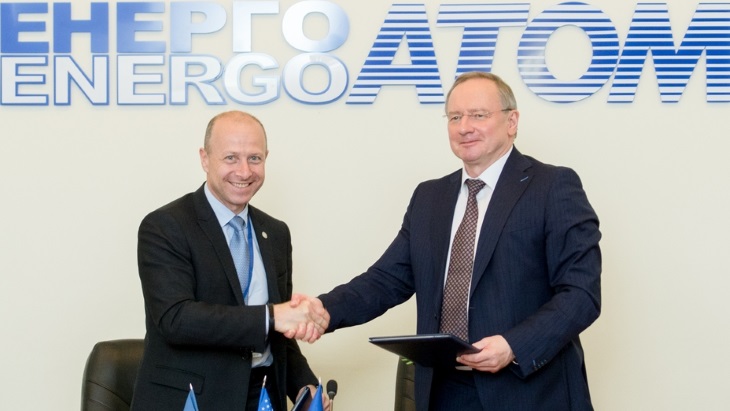The agreement was signed in Kiev on 2 September by Energoatom President and CEO Yury Nedahskovsky and Westinghouse Electric President and CEO Patrick Fragman. Energoatom also signed a Memorandum of Understanding and Cooperation in the nuclear energy industry with Westinghouse Electric Sweden AB, which already manaufactures fuel assemblies for VVER-1000 units.
Energoatom said it will support the regulatory and operational aspects of potential future deliveries of Westinghouse fuel for Ukrainian VVER-440 reactors, while Westinghouse will draw on its experience of the technology and fuel production for VVER-type reactors.
Nedashkovsky said the agreements were "confirmation of further expansion and deepening of cooperation" between the two companies. "This is evidence that Westinghouse understands our needs and that we are aware of its capabilities. Cooperation with Westinghouse occupies a decisive place in [Energoatom's] activities, as it relates to almost all of [its] main areas of operation," he said.
The main area is Energoatom's strategy to diversify the sources of nuclear fuel supplies for Ukrainian nuclear power plants, he said, adding that it expects Westinghouse fuel at unit 3 of the South Ukraine plant to be put into commercial operation by the end of this year. The company plans to load Westinghouse fuel into unit 5 of its Zaporoazhe plant during its scheduled maintenance outage.
Westinghouse is also a "strategic partner", Energoatom said, in the project to complete the construction of units 3 and 4 of the Khmelnitsky nuclear power plant - the so-called Ukraine-EU 'energy bridge'. The Khmelnitsky expansion project will include the use of Westinghouse’s automated process control systems.
"All these projects are aimed at strengthening the energy security of Ukraine and increasing the competitiveness of the Ukrainian economy," Nedashkovsky said.
In July, Ukraine’s Ministry of Energy and Coal announced that Ukraine Power Bridge Company Limited had won its tender for a private partner for the energy bridge project. This company is a consortium that includes Westinghouse, Nedashkovsky said. The project aims to make the export of electricity to the European Union possible by disconnecting unit 2 of the Khmelnitsky plant from the Ukrainian national grid, and to attract funding required to complete units 3 and 4 at the plant.
Fragman, who became the head of Westinghouse last month, said the company is interested in working with Energoatom on "as many projects as possible".
The MoU, which was signed by Nedashkovsky and the vice president and managing director of Westinghouse Electric Sweden, Aziz Dag, provides for the development of a feasibility study on the implementation of fuel assemblies for VVER-440 units by the end of this year. The document also envisages the development of a Westinghouse fuel licensing plan in Ukraine and an assessment of the readiness of the manufacturing process for components of fuel assemblies, including the consideration of the option of sharing costs for the fabrication of components for fuel assemblies for VVER-440.
A draft plan for the introduction of Westinghouse fuel for VVER-440 units in Ukraine is to be developed, with a schedule and details of the "distribution of responsibility" between the parties, Energoatom said. Their cooperation will also include Atomenergomash, a Ukrainian nuclear power equipment manufacturer, to produce some components for the Westinghouse fuel assemblies, with Energoatom sharing the cost of designing and fabricating them.
Energoatom announced in January 2018 it had extended its contract with Westinghouse whose fuel is used at six of the 13 units with VVER-1000 reactors - at the South Ukraine and Zaporozhe plants. From 2021, it will supply fuel for a seventh unit, at the Rovno plant. In December that year, Westinghouse announced it had produced its thousandth fuel assembly for VVER-1000 type reactors - for South Ukraine. Alexander Shavlakov, first vice president and technical director of Energoatom, said then that diversification of sources of nuclear fuel supply for VVER-440 reactors was a "promising area of cooperation".
Shavlakov said diversification of sources of nuclear fuel supply for VVER-440 reactors is a "promising area of cooperation".







_55401.png)
_23009.jpg)






